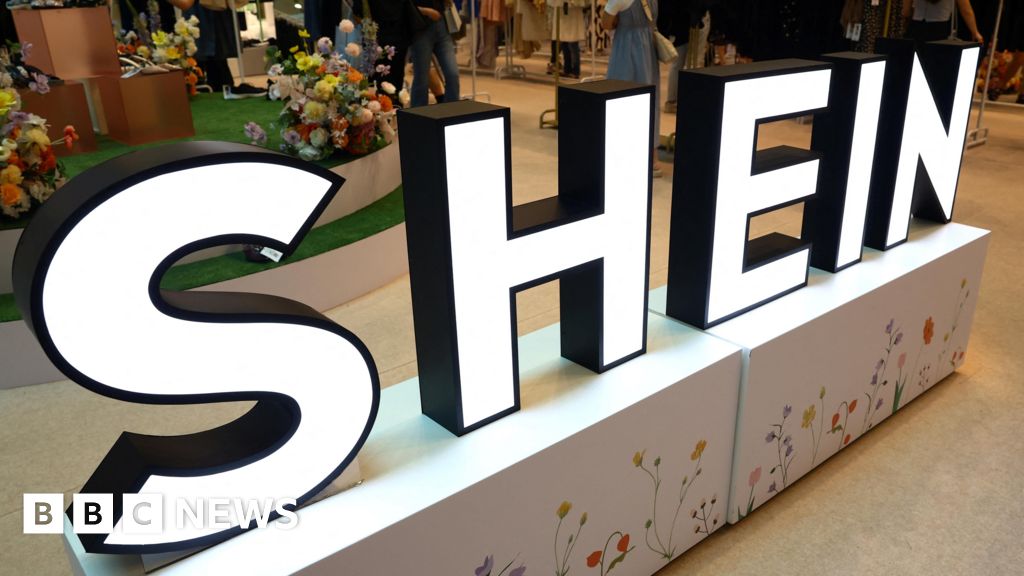


Charlotte Edwards,BBC Business reporter
 Reuters
ReutersWorkers for some suppliers of Chinese fast fashion giant Shein are still working 75 hours a week, despite the company promising to improve conditions, a report suggests.
A new investigation by Swiss advocacy group Public Eye has followed up on its 2021 report, which found a number of staff across six sites in Guangzhou were doing excessive overtime.
According to the group, who interviewed 13 employees from six factories in China supplying Shein for its latest investigation, excessive overtime was still common for many workers.
Shein told the BBC it was “working hard” to address the matters raised by the Public Eye report and had made “significant progress on enhancing conditions”.
Shein has grown rapidly since it was founded in 2008, and was one of many online businesses to boom during the Covid pandemic lockdowns.
Its formula of offering a wide range of cheap clothes – backed up with campaigns on Instagram, TikTok and other social media – has turned it into one of the biggest fashion retailers in the world.
It relies on thousands of third-party suppliers, as well as contract manufacturers, near its headquarters in Guangzhou, and is able to turn around a new item in a matter of weeks, rather than months.
However, an employee who has worked at sewing machines for 20 years told Public Eye: “I work every day from 8 in the morning to 10.30 at night and take one day off each month. I can’t afford any more days off because it costs too much.”
The 13 factory employees were interviewed in the summer of 2023.
Interviewees worked at production sites west of Nancun Village in the Guangzhou area in southern China.
Public Eye did not return to Nancun itself, which was the location of the original interviews, claiming “the atmosphere was too risky” due to media attention from its initial report.
 Getty Images
Getty ImagesInterviewees, aged between 23 and 60, said they worked 12-hour days on average, which did not include breaks for lunch and dinner.
They said they usually work six to seven days a week.
Shein’s Code of Conduct for its suppliers states that workers should not work longer than 60 hours a week, including overtime.
The brand acknowledged this was a long-term issue when Public Eye first raised it in 2021.
In its response to the latest report, Shein said long working hours in the sector were a “common challenge that brands, manufacturers, and other ecosystem players must work together to address”.
It added that this was not a problem unique to Shein, but said it was “committed to playing our part to improve the situation in our own supply chain”.
 Getty Images
Getty ImagesWorkers also claimed their wages had hardly changed since the first investigation and fluctuate between 6,000 to 10,000 yuan per month (£663 to £1,104 a month).
Public Eye says the basic wage for workers after deducting overtime pay is 2,400 yuan (£265).
According to the Asia Floor Wage Alliance, a living wage in China is around 6,512 yuan (£719).
Interviewees claimed if they made a mistake, they would have to make any alterations to the clothes unpaid.
“Whoever makes the mistake is responsible for putting it right. You have to fix the problem in your own working time,” a 50-year-old supervisor told the investigation.
Workers also claimed to have noticed a rise in surveillance cameras in the factories, and said they believed the footage was sent to Shein in real time so regulations could be enforced.
Public Eye also said it observed toddlers being babysat in the factories, teenagers packaging items and a smoking ban not being enforced.
In a statement to the BBC, Shein said it was investing tens of millions of dollars “in strengthening governance and compliance across our supply chain”.
“We are actively working to improve our suppliers’ practices, including ensuring that hours worked are voluntary and that workers are compensated fairly for what they do, and also recognise the importance of industry collaboration to ensure continuous improvement and progress in this area,” it said.
“As a result of our efforts, research we have conducted with our third party auditors has found that workers at Shein supplier facilities in China earn basic salaries that are significantly higher than the average local minimum wage. ”
Shein told Public Eye that suppliers were required to ensure they met local laws and regulations governing wages and working hours.
“Where violations [of our governance policies] are found, we take firm action… [including] termination of the business relationship.”
With regards to surveillance cameras, Shein told Public Eye that suppliers made their own decisions to install cameras in their facilities, and the company did not have access to suppliers’ security camera feeds or footage.
Regarding children in factories, the company told Public Eye: “We strictly do not tolerate child labour. We treat any violations with utmost severity.”
It acknowledged that some factory staff faced a challenge of balancing work and childcare, which “can result in workers bringing their children to their workplace”.
“Being aware of this, we provide financial support for suppliers to create childcare centres within or near their premises.”